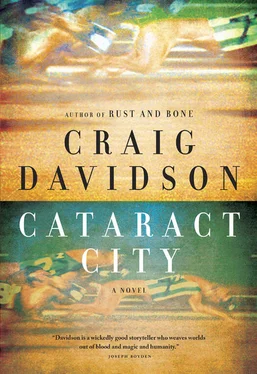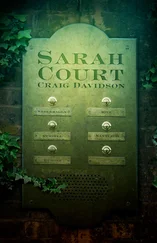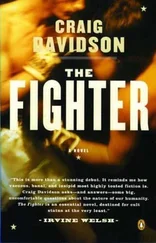Duncan unzipped his parka. His fingers roamed under his sweater, investigating his chest. “Sorta like heartburn. Worst case ever.”
Starlight reflected off the curved metal jutting from his waistband.
I said, “What’s that? Tucked into your pants.”
His gaze met mine, the momentary quiver in his eyes hardening. He lifted his sweater to show me Bruiser Mahoney’s gun.
“Mind telling me why you’re carrying that?”
“I wasn’t planning to shoot Drinkwater, if that’s what you’re asking.”
“You carry a gun, Diggs, you ought to have a reason.”
“Gee, thanks, pops.”
We stared at each other evenly. The blood on Duncan’s face was freezing to a shiny glaze.
“I’m not asking that you hand it over …”
“But you’d highly recommend it?”
“This is still a police investigation, Diggs.”
Duncan pulled the sweater over the gun and zipped his parka up.
We stripped the skidoo. Duncan detached the oil reservoir and dumped the oil. Next he used the Leatherman to cut the length of rubber hose connecting the air intake to the carburetor, unscrewed the gas cap and slid the hose down. He sucked until his mouth flooded with gasoline, retched, and siphoned gas into the reservoir.
I unscrewed the mounts and tore out the twelve-volt battery, along with a few connecting wires. I slit the nylon straps mooring the shotgun to the frame and pulled it free.
Drinkwater’s tracks were gone. He must have edged his way down west of here, where the incline descended more gently. He’d be miles away by now. Back over the river, maybe, in his truck driving towards some sleepy border crossing.
We weren’t far from the river — fifteen miles, tops. But the incline was too steep to retrace our path. Possibly our best bet was to stay put. If a search helicopter swept past, it might spot our fire — providing we’d retained enough of our Boy Scouts fire-craft skills to build one.
Standing shoulder to shoulder, we peered into the forest. My eyes had become accustomed somewhat, but human eyes were not built for this kind of dark. Here and there I caught — sensed? — sly shiftings and shadings, movement tracing over the rocks and trees. I squinted at the luminescent hands on my watch. It was past 2 a.m. On a typical Friday night I’d be … drunk, probably. Passed out in bed. My warm, soft bed.
I gestured into the heart of the woods. “Got to be something. A road, a logging route, an old trapper’s shack.”
“Something. Sure.”
Duncan hitched the satchel up on his back. I slung the shotgun over my shoulder. We entered the blackness of the woods.
A winter forest is pure whiteness rolled flat. Austere endless white that dissolves every landmark. Imagine trying to find your bearings on the moon.
It’s tough going, especially without snowshoes. Each footstep breaks through the snow crust, miring your boots in the soft powder. Before long the eyelets and uppers are iced over and heavy. Envy of chipmunks and dormice sets in: weightless creatures who skitter across the crust.
Cold radiates from that whiteness, borne on slinking winds that curl under pant-legs and down collars. Coldness wraps around your skull, encasing the brainstem in ice. You get foggy-headed with it, and it dawns on you that all you want to do is sit. Your boots are so heavy it’s like hauling anvils. The snow is soft and inviting. People who freeze to death are often found with faint smiles on their faces: during those last moments they occupy a different geography in their minds. You have to fight the urge to just … sit … down .
We trod lightly, bodies tilted against the wind, carving a path between the poplars. The naked branches knit together, a latticework of angles shielding the winter sky. We were tired and achy but the adrenaline hadn’t yet burned off. A snowy owl watched from a low branch, eyes shining in the ruffled oval of its face. It hooted — a trilling, melancholy note — and took flight, white wing-tips trailing into the darkness.
We’d barely covered a mile before we came across Drinkwater’s skidoo. Its hood had crumpled against a lightning-felled oak, and one ski had snapped off and stuck in the bark. The right tread had sheared off its runner.
I set a gloved hand on the muffler. “Still warm.”
Fifteen feet past the fallen tree we could make out the spot where Drinkwater’s body had hit. There was a dark stain on the snow the size of a dinner plate. I inspected the skidoo’s empty webbing and untied straps, figuring Drinkwater must have scavenged it. Dark coins dotted the snow around the machine. From there, Drinkwater’s footsteps advanced into the woods in a determined line.
I pulled Duncan down behind the skidoo. “He could be out there. He’s got a gun.”
I imagined Drinkwater hunched a hundred yards off, eyeing us down a rifle’s sights. Worse, I pictured Drinkwater bleeding out somewhere in the dark, stubbornly refusing to call for help.
“Lemmy!” Dunk shouted, as if channelling my thoughts. “You all right?”
“ Shut it ,” I hissed. “What’s the sense of that?”
Duncan didn’t answer. The effort it took to shout doubled him over. “He’s running,” he managed to say through gritted teeth.
“You don’t know that.”
“He’s hurt and he’s running, Owe. He could die out here.”
“We could, too.”
We sat with the possibility until I said, “Twenty years later … Finnegan, begin again.”
Duncan smiled. “Same shit, different day.”
We shared a gravedigger’s laugh. The cold locked around our joints, crimping our nostrils shut with each inhale.
“We should make a fire,” Dunk said.
“He could see us.”
“If he doesn’t make one himself he’ll freeze to death, anyway.”
We cleared a spot next to the skidoo, scraping with our boots until we hit the frozen earth. We snapped twigs off the fallen oak. Duncan doused the heap with gasoline and pulled a flare from the satchel.
“Not that,” I said. “We may need it later.”
I sat the twelve-volt battery on my lap, stripped the plastic coating off two wires and twisted one around the negative coil and the other around the positive coil. When I touched the wire-tips, they glowed. I rubbed them over the kindling pile until a spark caught the gasoline.
We sat on the skidoo seat, hands held to the licking flames. The twigs crackled and glowed, sending up a grey coil of smoke. I thought about how making this fire didn’t have the same life-or-death quality it had when we were kids down to one paper match with the darkness chewing at our backs. But it still felt like a distinctly human act that set us apart from the surrounding wilderness.
I peered across the flames, following Drinkwater’s footsteps into the gloom. Was there a faint flicker out there? A wavering orange dot? It could have been a few hundred yards off, a mile, or a trick of my fatigued mind.
“You think he’s out there?” Dunk asked.
“He’s a survivor. I heard Native boys used to get sent out into the woods for a week, no food, no nothing — a quest, to find their spirit animal. A raven, a wolf, a bear. Once they’d found it, they returned to the tribe and were accepted as warriors. I’m not saying that happens anymore. It’s a survivor culture is all I’m thinking. Hey, what if you found out your spirit animal was a weasel?” I laughed. “What if a worm came to you in your dreams?” Laughing even harder. “I’d lie my ass off. Tell the chief, Oh, yeah, I saw a moose. Big mean bastard .”
Dunk found a shard of clear ice and bit into it as if it was peanut brittle. We both ate a protein bar. We had three guns between us, but no rifle. I wondered if Dunk would try to shoot something with Bruiser Mahoney’s old pistol, just like Mahoney had shot that poor raccoon.
Читать дальше












